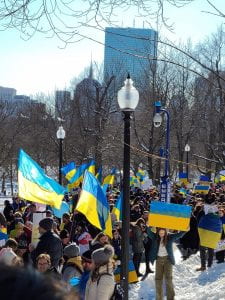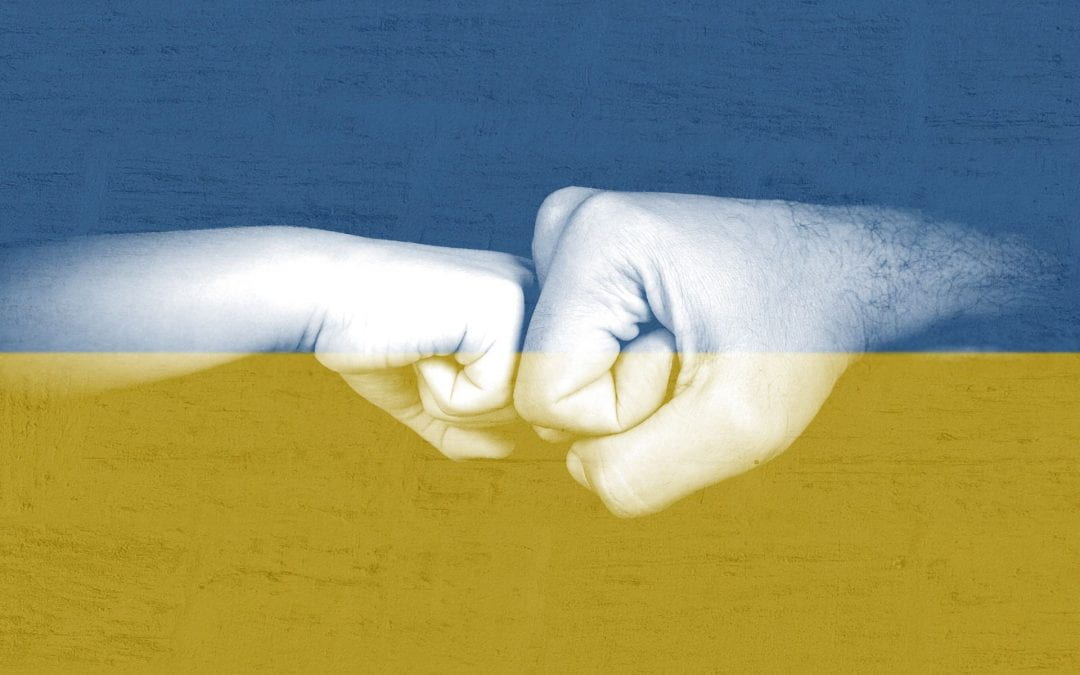Russia’s invasion of the Ukraine started on February 24, 2022, and since then the Ukrainian population has been facing severe adversities. This ongoing war between the two countries has had adverse geopolitical implications, which have been covered by the mainstream media channels and News@Northeastern as well.

NUMedia’s team wanted to explore this topic from a student perspective. What does it feel like to live in another country when your family and friends are in Ukraine in the middle of a war? How are they coping with this stress while being a full-time student or on a co-op?
We had the opportunity to interview Zachar Hankewyz and Terenia Hankewyz from the Ukrainian cultural club at Northeastern for their perspectives on the war.
Our conversation with Zachar and Terenia is below.
What is your perspective about the situation in your home country?
Zachar Hankewyz: I am not an international student — I was born in America, as were my parents. My grandparents fled the Soviet Union after the second World War, since my family contained multiple Ukrainian Greek Catholic priests — a target for Soviet persecution.
However, the diaspora in America has not forgotten their roots. Despite living in America, my native language was Ukrainian. Every Saturday, my siblings and I went to Ukrainian school. We take part in Ukrainian organizations, attend Ukrainian churches, and keep our traditions alive. Because Ukraine is strong. Even when our people couldn’t live in their own country, they never forgot her, never forgot their culture.
Despite everything that Ukraine has suffered through, our country remains standing. And in the face of this invasion bereft of any humanity, every Ukrainian is doing everything they can to help. It’s in our nature, and it hurts the diaspora to no end having to see the devastation Ukraine is suffering while being so far away.
What is one thing that Americans may not understand about the conflict that you would most want them to know?
Zachar: This is not an isolated invasion; this is not a new war. Mr Putin is simply the latest in a long line of Russian leaders for whom the very existence of a Ukrainian people is anathema. Just as with Pyotr Valuev (who in 1863 claimed that a “Little Russian” [ie. Ukrainian] language does not — and never will — exist), the Russian imperialism of today is justified only by a pseudo-historic worldview.
The same is true for the Emz Ukaz, the forced resettlement of left-bank Ukrainians, the systemic oppression of the Ukrainian language, culture, and traditions. We fought to free ourselves from Russian oppression in 1918, and in the 1940s, and continue to do so today.
How are you keeping in touch with your Ukrainian relatives or friends?
Zachar: Mostly via phone/Telegram/whatsapp
How is it like to cope with such a stressful situation as a full-time student?
Terenia Hankewyz: Difficult. I am constantly feeling overwhelmed (as can be seen by my inability to respond to emails in a timely manner, sorry about that!). I have a very heavy courseload this semester, so dealing with schoolwork is time consuming on it’s own.
And then with the war in Ukraine on top of that, it’s a lot. I’m now spending countless hours scrolling through news, checking to see which cities have air alerts at the moment, what locations have recently been hit, what the latest tragedies are. I’ve also been exhausting myself organizing events with the Ukrainian Cultural Club, dancing at various fundraisers with the MIT Ukrainian Folk Dance Ensemble, and attending and helping plan every Ukrainian event I can. Though I’m getting better at managing my stress, I still find myself facing many sleepless nights and hectic schedules.
Zachar: Personally, I am on co-op, which I think helps. Right now, I’m able to work 9 to 5, and then fully concentrate on planning events, talking to friends, working for the volunteer organization I’m a part of. With classes, I think this would be much harder to do, since the academic work may be more demanding (and takes up evenings and weekends).
If you would like to support Ukraine, the Ukrainian club is collecting donations via HuskyStarter.
In case you want to contribute your time, organizations around Boston like Ukrainian Churches (Christ the King and St. Andrews) need help in delivering humanitarian aid.
